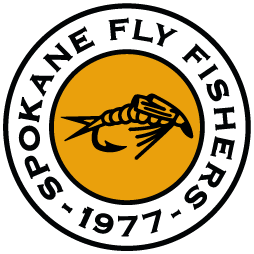New Materials to Purchase. Before the review I want to invite members to submit to me or to Rick Newman the titles of any books or videos they would like to see us purchase for the library. We will be buying new materials to update our collection, so any suggestions will be sincerely
appreciated.
Sidenote from Rick Newman I will be providing a list of the new titles here so you can be prepared to check them out when ready, hopefully during the September meeting. I am very excited about what we purchased and I think you will be too.
Another Lady on the Fly. In some past columns I have included fly fishing works by or about women in our sport, in celebration of the movement of women into fly fishing. This month, in continuation of this recognition, we will review I Don’t Know Why I Swallowed the Fly by Jessica Maxwell. I Don’t Know Why I Swallowed the Fly is Ms. Maxwell’s earnest description of a complex journey – an odyssey, really – that labors through learning to fly cast, to read water, and finally, to maintain the patient determination needed to pursue winter steelhead. Along the way, she comes to appreciate the differences between how men and how women approach the sport and, finally, arrives at an ultimate reconciliation with a late father who was affectionate, yet somehow incommunicative. If that all seems like a mouthful, well, this book is just that! Reading I Don’t Know Why… is like trying to negotiate and fish one of those streams with drop-offs, pocket water, and conflicting currents, all while keeping a tight line and remaining aware of the position of your fly.
Maxwell begins with recalling childhood trips to the southern California beaches from which her father would surf cast while she and her sister explored tidal pools. How she longed to join him in the surf. How she wishes she could communicate with him now, long after he is gone, over her
recurrent fishing woes. As her story progresses, this thread is like that one metallic strand that cuts through a tapestry that is otherwise woven of more uniform fabric.
The author is a master at metaphor, as is made clear in the early chapters describing the characters with whom she travels and the rivers upon which she concentrates (most especially the Deschutes in Oregon). Her relationship to her mentor, Guido (pronounced gee-doh, not gwee-doh), who she met while fishing for taimen in Mongolia, is described as to make the reader suspect a romantic connection. But, surprisingly, when Guido’s love interest focuses on another (who also becomes a key character), the teacher-pupil relationship is not harmed. In fact, Lee becomes an admired, close friend and confidant who tempers Guido’s mentoring drive. Meanwhile, Maxwell’s infatuation with the Pacific Northwest and its trout and steelhead rivers will resonate with most of us. Indeed, her descriptions of fishing the misty rivers amid the damp rainforests of coastal Oregon and Washington, along with the river guides and the food they prepared and served, are positively delicious.
At times her reflections and introspections threaten to dissolve into psycho-babble. Those of you who enjoy delving into the world of psychology and human emotional makeup will likely enjoy this element of Maxwell’s story; I found it laborious and distracting and, at several points, skipped that
narrative until the subject returned more directly to fishing. Likewise, her attempt to link the science of physics and atomic particles to her eventual arrival into what she labels “The Fishing Zone” made for similarly strenuous reading (although her description of her mother’s dinner meeting with Albert Einstein, and her response to his question regarding the theory of relativity, was fairly amusing).
Not that I Don’t Know… isn’t entertaining. Richly metaphorical and replete with humorous asides, at times it keeps one almost spellbound. Maxwell’s attempt to organize an all-girl fishing trip to Montana, which is ultimately pared to a married friend who is fishing for the first time, the author, and famed fishing guide Steve Smith, is an adventure in itself. The reader will also relate to those moments when the author experiences epiphanies over finally learning to cast effectively and, ultimately, her realization of the true source of joy over fly fishing. Which, at last, is powerful enough to redeem those parts of the book that are difficult.
